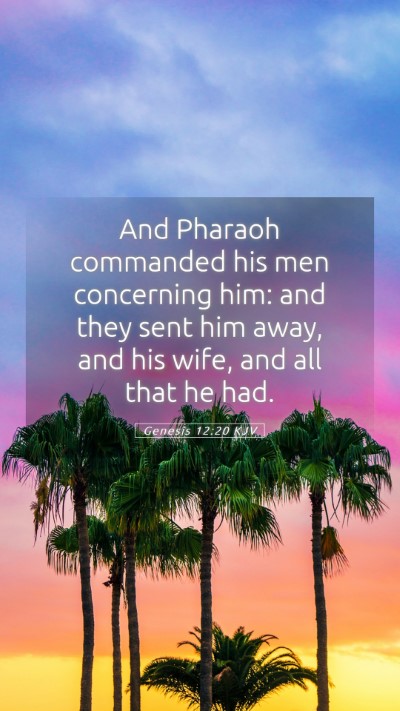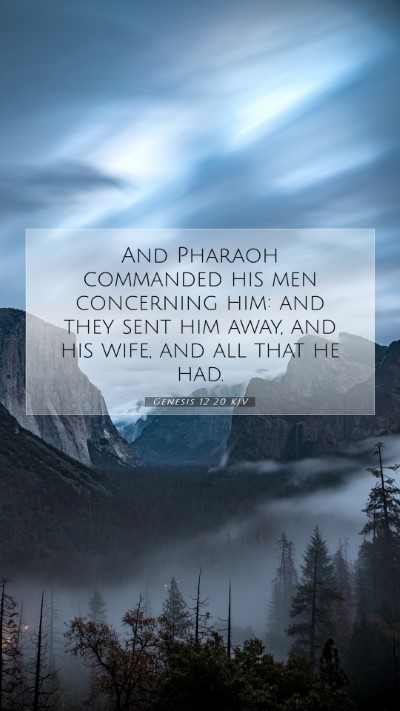Understanding Genesis 12:20 - Bible Verse Commentary
Genesis 12:20 states:
"And Pharaoh gave men charge concerning him: and they sent him away, and his wife, and all that he had."
This verse marks a significant moment in the narrative of Abraham (then Abram), establishing the context for understanding his journey and the surrounding circumstances.
Summary of Bible Verse Meaning
This verse concludes the account of Abram's sojourn in Egypt, where he had gone during a famine. His actions while in Egypt, particularly his deception regarding Sarai's identity, play a critical role in the events that unfold. The overarching meaning can be derived from several key commentaries:
- Matthew Henry:
Henry notes that despite Abram's fear and subsequent dishonesty, God still showed favor to him by protecting Sarai and eventually causing Pharaoh to send them away with abundant gifts. This highlights God's grace even amidst human failures.
- Albert Barnes:
Barnes emphasizes that Abram’s sojourn in Egypt was a test of faith. His actions serve as a reminder that individuals may falter, but God remains sovereign and faithful to His promises, bringing about protection and deliverance.
- Adam Clarke:
Clarke reflects on the moral implications of this verse, illustrating the consequences of fear and deceit. He points out that God's intervention spared Sarai from harm and allowed Abram to leave Egypt unharmed, reinforcing the idea of divine oversight over human affairs.
Key Themes
- Divine Protection: The verse illustrates that while mankind may err, God’s protection prevails. Abram, despite his actions, is safeguarded, illustrating God’s commitment to His covenant.
- The Nature of Faith: This incident serves to teach about the complex nature of faith. Even a patriarch like Abram faced trials that tested his faith, thus encouraging readers to reflect on their own beliefs during difficult times.
- Moral Consequences: The resultant actions stemming from Abram’s deceit serve as cautionary tales about the potential fallout of choosing disobedience over trust in God.
Application and Relevance
For contemporary readers, this verse beckons a contemplation of how faith interacts with everyday choices. It prompts believers to consider:
- How do I respond to fear in my life?
- What can I learn from Abram's journey about honesty and integrity?
- In what ways does this passage reflect God's continuous work in spite of human shortcomings?
Cross References
This verse can be understood more fully when cross-referenced with:
- Genesis 12:11-13: Where Abram initially deceives Pharaoh about Sarai's identity.
- Genesis 20:2: Another similar incident involving Abram and Abimelech.
- Genesis 15:1: Where God reassures Abram of His protection and promises.
Final Thoughts
Genesis 12:20 encapsulates the protective hand of God over Abram amidst his failures, urging readers toward deeper Bible verse understanding and scripture analysis. The exploration of verses like this not only augments personal faith but serves as a roadmap for navigating life's challenges through trust in divine providence.


